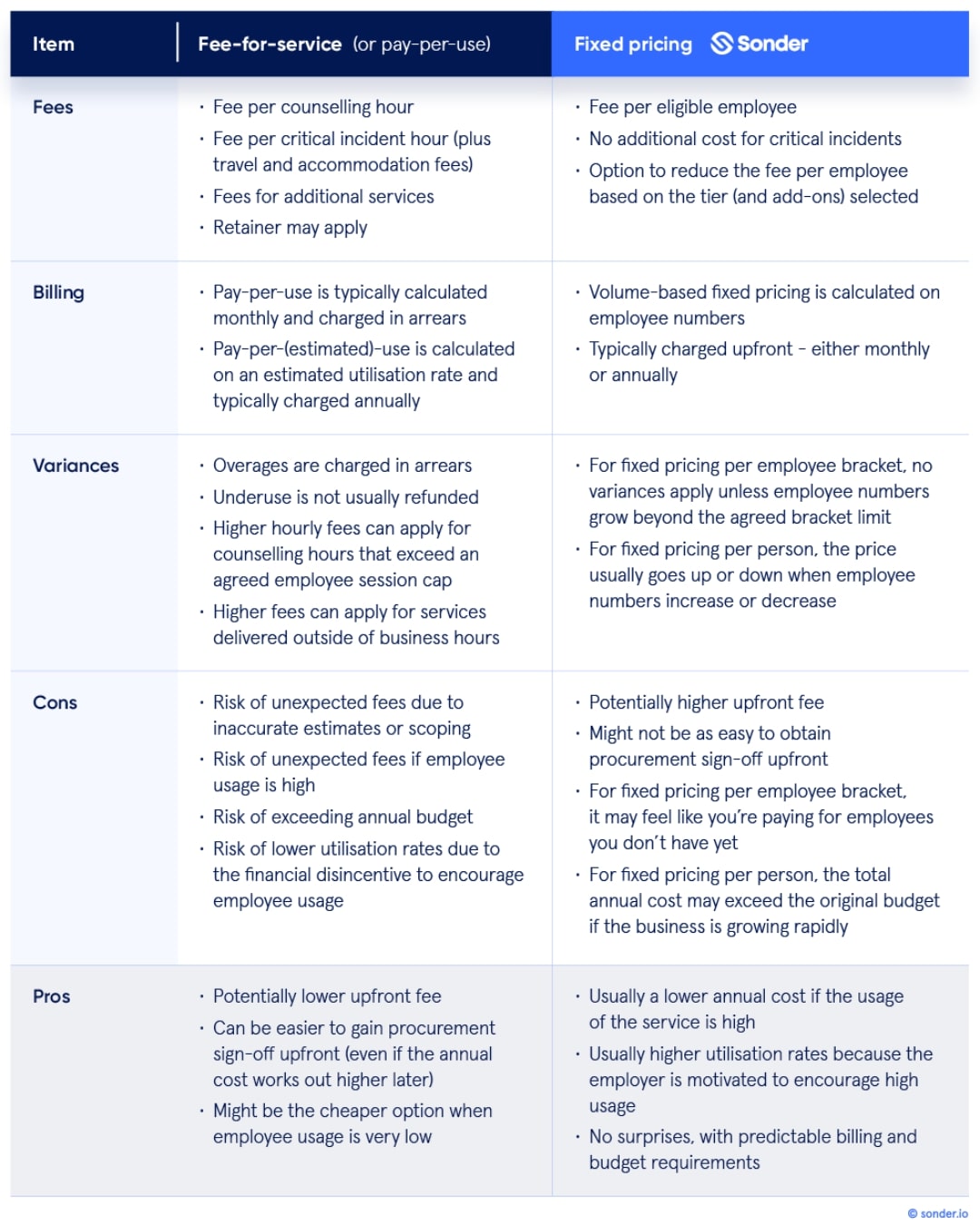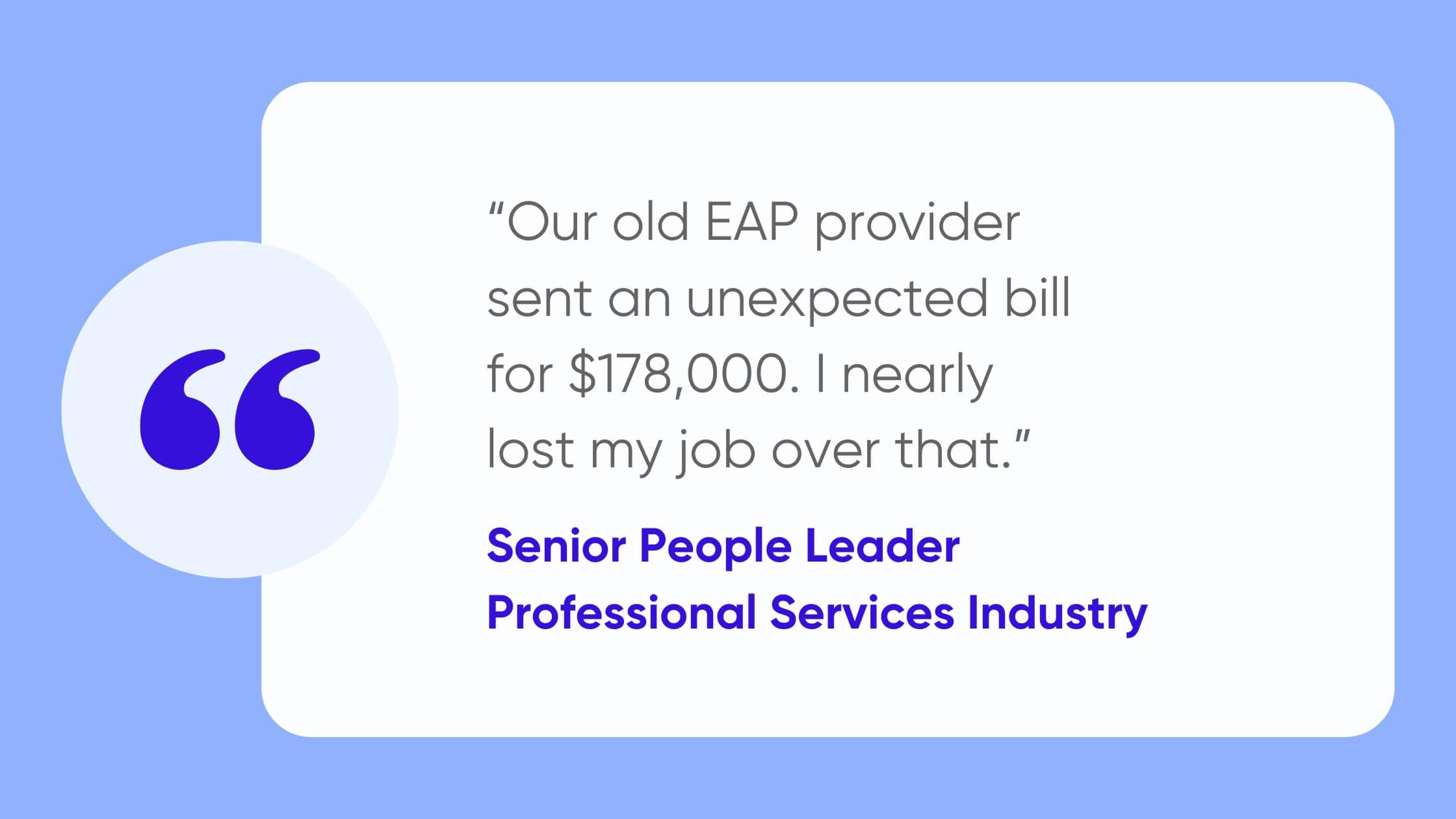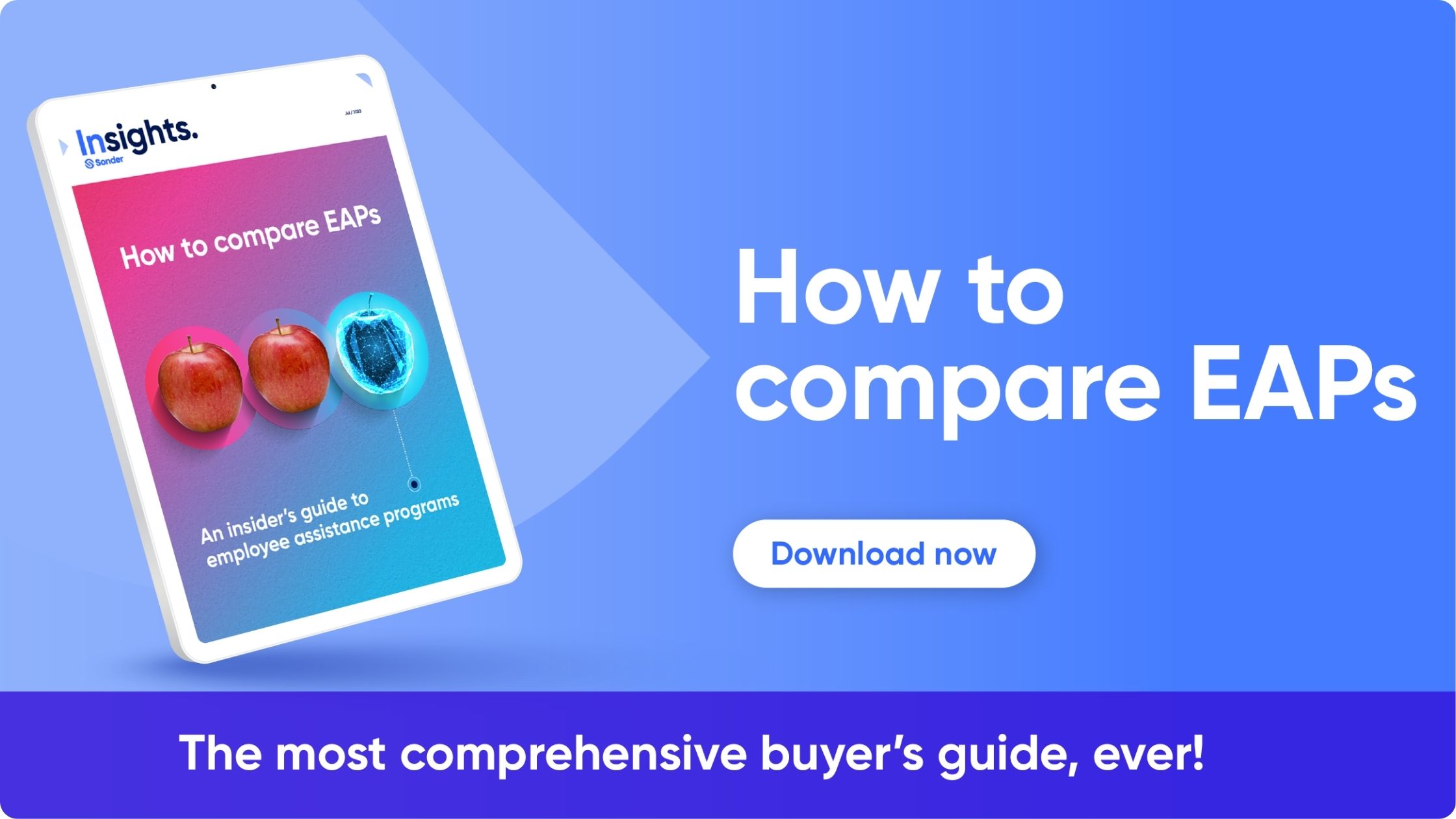TL;DR summary:
- EAP counselling offers confidential, professional support for personal and work-related issues at no cost to the employee.
- While the organisation bears the cost, EAP counselling provides significant benefits, enhancing workplace wellbeing and productivity.
- Sonder provides an alternative holistic solution to traditional EAP counselling, making it more accessible, affordable and comprehensive, supporting a modern workforce.
One key barrier to seeking professional support is the question, “Is EAP counselling free?” Uncertainty about who pays for counselling sessions can be a major roadblock for many employees.
Currently, over 5 million Australians are navigating mental health challenges. But it’s becoming more difficult and expensive for Australians to access mental health services.
In 2022, the Federal Government reduced the number of subsidised psychologist visits from 20 to 10 visits per year. By 2023, more than 50% of psychologists are reporting an increase in wait times, with 96% concerned the changes will have negative impacts on patient mental health.
With fewer cost-effective options available, it’s never been more important for organisations to offer subsided mental health support and counselling to team members.
For employers, understanding the costs and pricing models used by EAP providers for counselling services is key to making an informed decision. In this blog, we’ll be walking you through the costs of EAP counselling, how it works and what to look for in a provider’s pricing model.
EAP counselling 101: what you need to know
Counselling is one of the most common support services offered by traditional Employee Assistance Programs (EAPs). These confidential sessions give employees a chance to discuss and tackle challenges they’re facing, both inside and outside of the office.
From stress to burnout and financial stress, counselling sessions are delivered either in-person or online to enable employees to tackle issues that might be impacting their ability to perform at work. In many cases, these counselling services are also extended to include an employee’s immediate family members.
“Psychology isn’t just about making people feel better, it’s about helping people become employable, stay in work, keep families together, let people live with dignity, and save lives.”
Dr Catriona Davis-McCabe
Australian Psychological Society (APS) President
Unpacking the costs of EAP counselling
Before diving into the costs of EAP counselling, it’s important to consider the costs of not addressing mental health and wellbeing challenges proactively in the workplace.
If poor employee wellbeing is left unchecked and untreated, individuals are more likely to be less productive at work or may take extended time away from their jobs, too. This can have a meaningful impact on organisations, with total productivity losses from absenteeism ranging from 1.4 to 2.8 times the value of an impacted worker’s wage.
Absenteeism is estimated to cost the Australian economy over $35 billion in wages and lost productivity.
Direct Health Solutions
*Source: https://www.dhs.net.au/news/2019-absence-management-wellbeing-survey-report
While there is a level of investment required, offering free EAP counselling is a powerful step employers can take to boost the morale, productivity and wellbeing of their entire workforce.
Who pays for EAP counselling?
In most cases, employers pay for EAP counselling.
This investment is seen as part of the organisation’s duty of care towards its employees, aiming to support their general wellbeing and maintain high levels of productivity in the workplace.
Is EAP counselling free?
Yes, EAP counselling is usually free for employees. This service tends to be seen as a short-term solution, meaning employees can access a certain number of counselling sessions for free (typically around three to four sessions per year).
If ongoing support or additional services are needed, employees can be referred to other professionals and specialists as required. Depending on the company’s EAP policy, these costs may be covered by the employer, too.
EAP counselling pricing models compared
So, how do employers pay for employees to access EAP counselling? Typically, EAP providers offer one of two pricing models:
- Fee-for-service pricing: in the case of counselling, this would mean employers pay per counselling hour with fees increasing in line with employee usage.
- Fixed pricing: with a set monthly or annual cost, this model encourages high usage with no cost surprises and predictable billing for employers.
Whilst a per-hour or fee-for-service model can be cheaper upfront, its annual fee can balloon into a more expensive option when there is high employee usage. This scenario can also act as a two-edged sword: discouraging employers from boosting utilisation of the service.
Example pricing models

When it comes to costs, a fee-for-service model can see employers charged an annual retainer fee and a fee for individual counselling sessions. That’s why it’s important to dig into the fine print and understand exactly how billing works before signing up with an EAP provider.
The challenges of traditional EAP counselling
Here’s the thing about traditional EAPs: they’re usually very limited in scope. Typically, EAPs are focused on counselling services, often intervening only when employees reach a mental health crisis moment.
For employers, sticking with a fee-for-service EAP provider often makes it incredibly expensive to offer comprehensive support to employees beyond a handful of counselling sessions. Additional services come at an additional cost, often requiring companies to invest in multiple tools rather than an all-in-one solution.
From a cost perspective, there are a number of drawbacks to traditional EAP counselling:
- Higher usage = higher costs: With a fee-for-service pricing model, companies can see expenses skyrocketing if teams show high engagement with traditional EAP counselling, particularly in larger teams.
- Lack of cost visibility: With a patchwork of tools providing siloed support to employees, it can be difficult for organisations to gain a clear view of how much is being spent on employee health and wellbeing.
- Treating the symptoms, not the cause: By focusing only on crisis-point intervention, traditional EAP counselling tends to be less impactful than holistic wellbeing programs. Plus, high absenteeism, decreased productivity and increased attrition are more common when employees only have limited support services available.

Sonder offers an innovative, prevention-focused care platform that simplifies access to professional and confidential support. We approach employee health, safety and wellbeing with early intervention, looking beyond counselling to actively prevent crisis moments before they occur.
In practical terms, we give employees access to an all-in-one app, packed with wellbeing resources, 24/7 access to healthcare professionals, safety tools and a team of care providers ready to respond in-person as needed.
From a cost perspective, Sonder operates on a fixed, all inclusive annual fee for uncapped access to professional care across medical, mental health and safety services for employees and their families.
This means companies can drive maximum awareness, usage, and engagement of Sonder without worrying about unexpected monthly bills or hidden fees.
With usage rates typically 10-20x higher than traditional assistance programs we replace, employers can rest easy that their workforce and their organisation will see a significant return on investment.
The best bit? The estimated ROI for holistic wellbeing programs, like Sonder, is even higher when mental health support is combined with other types of support-beyond counselling alone.
The way forward with Employee Assistance Programs and their alternatives
Want to learn more? Dive deeper into the world of EAP alternatives and discover how they can transform your organisation with our ultimate EAP buyer’s guide.
- Learn how to compare vendor offerings
- Discover what makes EAP alternatives different
- Gain insider tips and statistics
- Write a convincing business case

Want to learn more?
Ready to experience a modern approach to employee care? Contact Sonder today to discover how our platform can benefit your organisation.



